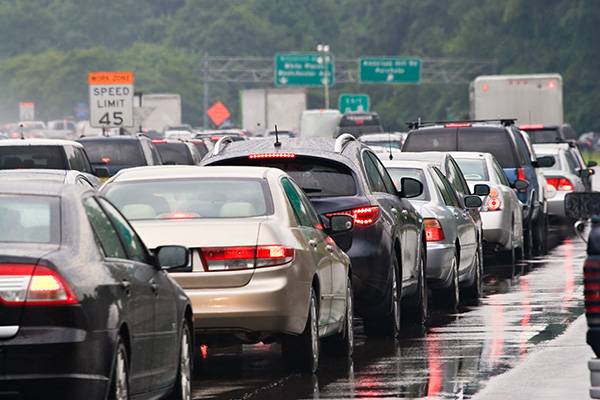
It's a hot day, you're stuck in traffic, and you notice the temperature gauge on your dashboard creeping up. This is a stressful situation for any driver, and it’s a common one because engines are more prone to overheating when your car isn’t moving. But why does this happen? And what can you do to prevent it?
If your engine heats up during traffic but stays cool while cruising, you’re not alone. Here’s what’s happening and what to check if it keeps occurring.
Less Airflow Means Less Cooling
At highway speeds, your vehicle’s radiator gets cooled by the flow of outside air passing through the grille. But in traffic, with little or no movement, that airflow drops dramatically. This makes your cooling system rely almost entirely on the radiator fan to keep temperatures down.
If your fan isn’t working properly, or if it cycles on for too long, the engine can overheat quickly while idling in place. In some cases, the fan motor or a related relay may be faulty. A broken fan won’t provide the airflow needed to remove heat from the coolant.
Low or Old Coolant
Coolant does more than just prevent freezing. It circulates through the engine to absorb heat, then travels to the radiator, where that heat is released. If your coolant is low, dirty, or degraded, it can’t perform this job effectively.
Coolant breaks down over time and can also develop air pockets if not properly flushed. An old radiator cap that doesn’t hold pressure can allow coolant to boil at lower temperatures, reducing efficiency. Regular coolant flushes and inspections help avoid these issues.
Failing Thermostat
The thermostat is a small but essential part of your engine’s cooling system. It opens and closes to control the flow of coolant based on the engine’s temperature. If it gets stuck closed, coolant won’t circulate through the radiator, causing the engine to heat up even during light use.
A faulty thermostat often leads to overheating while idling, but not necessarily while driving at speed. Replacing it early can prevent engine damage down the line.
Radiator or Water Pump Problems
The radiator and water pump are central to how your engine stays cool. The water pump pushes coolant through the system, while the radiator disperses heat. If either one is clogged, damaged, or failing, the system loses efficiency.
A partially clogged radiator might allow enough flow during cruising but not enough when stationary. Likewise, a worn water pump may circulate coolant inconsistently or leak over time. These problems often develop slowly but can lead to overheating in stop-and-go traffic.
Faulty Temperature Sensor or Gauge
Sometimes the engine isn't actually overheating, but your sensor might be misreading temperatures. If your gauge suddenly spikes without other symptoms, it could be due to a faulty coolant temperature sensor or sending unit.
However, it’s never safe to assume the problem is just the gauge. Always have the vehicle inspected before continuing to drive it if your dashboard shows a high temperature.
Air Conditioning Adds to the Load
When sitting in traffic, most drivers have their A/C running. This puts an extra load on the engine, especially in warm weather. The A/C condenser sits in front of the radiator and adds heat that the cooling system must handle. On its own, this may not be an issue, but combined with weak airflow or low coolant, it can push the system past its limit.
If your car starts overheating only with the A/C on, this could be the reason.
What You Can Do If It Happens
If your temperature gauge begins climbing while in traffic, here are some immediate steps to help cool things down:
- Turn off the A/C to reduce engine load.
- Shift into neutral or park and gently rev the engine. This can help circulate coolant and engage the radiator fan.
- If safe, turn on the heater. It may feel uncomfortable, but it helps pull heat away from the engine.
- Pull over and shut off the engine if the temperature continues to rise.
- Never open the radiator cap while the engine is hot. Wait until it cools down completely before checking coolant levels or adding fluid.
Engine Overheating Solutions in Reading, PA
At Auto Pro in Reading, PA, our team can quickly diagnose and repair the cause of engine overheating. Whether it’s a faulty fan, low coolant, a clogged radiator, or something more complex, if your vehicle runs hot in traffic or you notice temperature spikes, bring it in for a full cooling system inspection. We’ll help you stay cool, safe, and stress-free on the road.